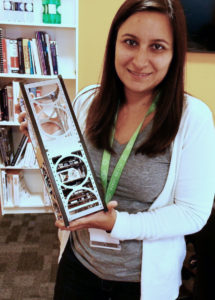Biological oceanographer Sara Rivero-Calle’s research focuses on microscopic marine plants known as phytoplankton. However, her approach to studying these tiny organisms is cutting-edge. Rather than collecting samples in research vessels, Rivero-Calle uses miniature satellites to study them from space.

Rivero-Calle holds a life-size model of a CubeSat satellite.
Rivero-Calle has joined the University of Georgia Skidaway Institute of Oceanography and the UGA Dept. of Marine Sciences as an assistant professor.
“With satellites, a whole new world opens up,” Rivero-Calle said. “You can look and take global snapshots of what’s happening in the ocean, which you can’t do if you have to go out in a boat and take your samples.”
“So, it allows me to think more globally and in terms of global processes.”
The miniature satellite Rivero-Calle has been using is named CubeSat and is only slightly larger than a shoe box. She began working with them while at UNC-Wilmington.
“I was involved with the first ocean color CubeSat, named ‘SeaHawk’, which is up in orbit right now,” she said. “We’re taking measurements in the visible part of the spectrum, which can tell us about the chlorophyll and the sediment in the water, and it can tell us about the water quality in general.”
Rivero-Calle describes herself as a “data junkie,” and the satellites help satisfy that appetite by providing massive amounts of it. Using historical satellite data, she can also analyze changes in the ocean over time. She is especially interested in the relationship between the ocean and the global climate.
Satellite oceanography is still a very new endeavor. Rivero-Calle says there is still lots of work to be done, and one of her goals is to improve the way scientists measure things from space.
“So, it’s basically looking at large scale processes and big data and to develop new algorithms to understand the nitty gritty of who’s actually in the water,” she said.
Rivero-Calle wants to bring the satellite technology into the classroom. She described low-cost CubeSat kits that are available.
“My idea is to have a really hands-on class where the students will actually put one of these CubeSats kits together,” she said. “We’ll learn how to write the code to have communications between the ground station and the satellite and then fly it on a drone, for example, so that you get the full experience of using CubeSats for environmental studies.”
Rivero-Calle also wants to become involved in actually designing new satellite missions, and building new satellites.
Rivero-Calle received her bachelor’s degree in biology from the Complutense University of Madrid, Spain, and her master’s degree in biological oceanography from the University of Puerto Rico. She received her Ph.D. in biological oceanography from Johns Hopkins University. Prior to joining UGA Skidaway Institute, Rivero-Calle was a post-doctoral research fellow at the University of North Carolina-Wilmington.


